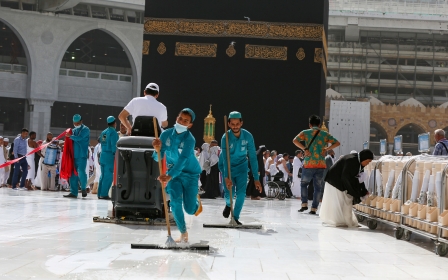Saudi Arabia to hold 'very limited' Hajj due to coronavirus

Saudi Arabia will hold a "very limited" Hajj this year due to the coronavirus pandemic, with only those living inside the kingdom allowed to take part in next month's pilgrimage.
The Hajj ministry said in a statement on Monday that the decision came in light of an increase in Covid-19 infections, the lack of a vaccine and difficulties with maintaining social distance rules among large numbers of pilgrims coming from overseas.
"A very limited number of pilgrims from various nationalities who already reside in Saudi Arabia, would be able to perform it," the statement said.
"This decision is taken to ensure Hajj is performed in a safe manner from a public health perspective while observing all preventative measures and the necessary social distancing protocols."
The virus causes mild to moderate symptoms in most people, who recover within a few weeks. But it is highly contagious and can cause severe illness or death, particularly in older patients or those with underlying health problems.
Usually, more than two million people perform the annual pilgrimage, including many travelling from abroad.
Earlier this month, Indonesia, the world's most populous Muslim nation, emerged as one of the first countries to withdraw from the Hajj after pressing Riyadh for clarity, with a minister calling it a "very bitter and difficult decision".
Malaysia, Senegal and Singapore followed suit with similar announcements.
In March, Saudi Arabia temporarily banned Umrah pilgrimages to the holy cities of Mecca and Medina for Saudi citizens due to concerns over coronavirus.
Nearly seven million people visit Mecca annually to perform Umrah. Prior to visiting Saudi Arabia, pilgrims are required to provide certificates for vaccinations in their visa applications.
Middle East Eye propose une couverture et une analyse indépendantes et incomparables du Moyen-Orient, de l’Afrique du Nord et d’autres régions du monde. Pour en savoir plus sur la reprise de ce contenu et les frais qui s’appliquent, veuillez remplir ce formulaire [en anglais]. Pour en savoir plus sur MEE, cliquez ici [en anglais].




